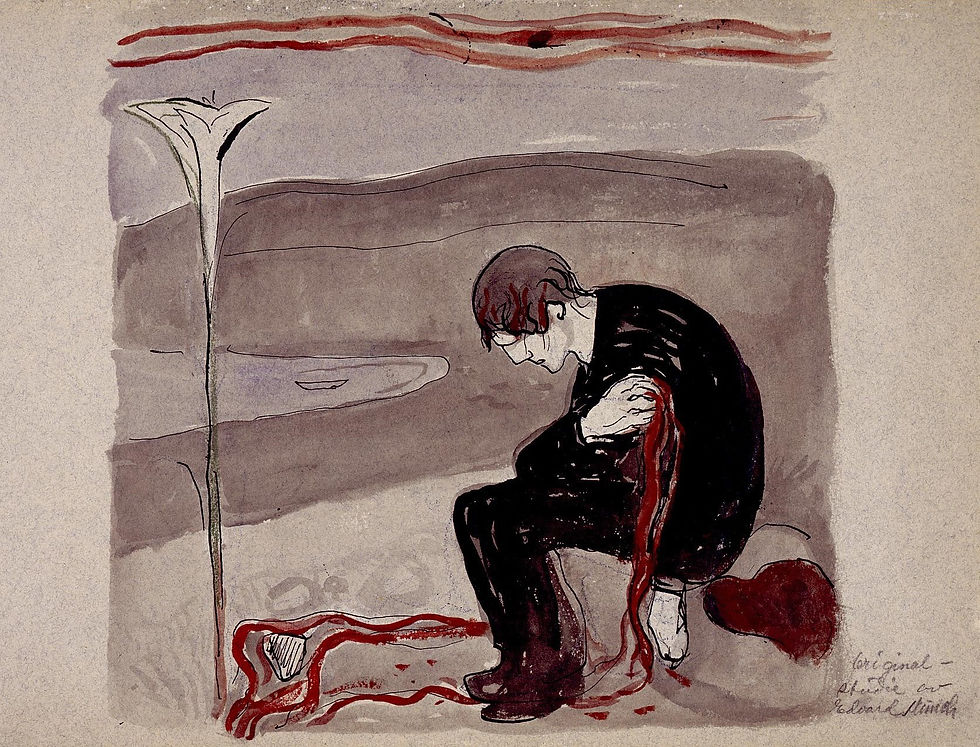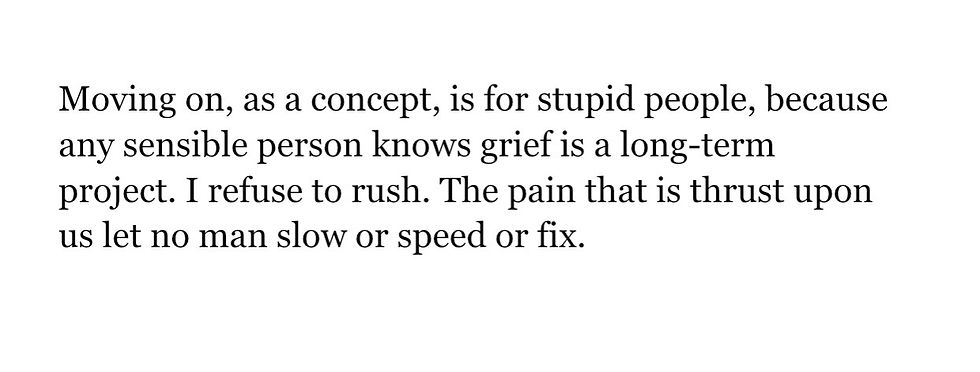"Grief is the Thing with Feathers" by Max Porter
- Khatia Nebulishvili
- Jul 31, 2025
- 4 min read

Life has a very simple rule: if we love, we grieve.
And grieve has quite a strict rules. And even though our eyes are blinded by the blackness of our trauma, we can not avoid these rules.
I met the "crow" when my grandma died- he sat on my shoulder, on my chest, in my throat. I couldn’t move without feeling him there. And even though he's quieter now, he never really left.
When someone we love dies we are shocked that somehow the world keeps turning: buses still show up, emails still come in, people are still talking about weekend plans; And the most surprising part is that we are still breathing.
And that’s exactly what happened to one of the boys in the book: He was shattered by the loss of his mother, he was shocked by the fact that not only every day life was still going without her, but also with the fact that there was no new language of crisis:
"So when he told us what had happened I don’t know what my brother was thinking but I was thinking this: Where are the fire engines? Where is the noise and clamour of an event like this? Where are the strangers going out of their way to help, screaming, flinging bits of emergency glow-in-the-dark equipment at us to try and settle us and save us?
There should be men in helmets speaking a new and dramatic language of crisis. There should be horrible levels of noise, completely foreign and inappropriate for our cozy London flat.
There were no crowds and no uniformed strangers and there was no new language of crisis."

Slowly, the shock begins to fade.
And in its place, a new guest arrives at the burnt-down house of your life.(Spoiler alert: this guest never leaves.)
It’s longing.
You start to miss them-even the things you once hated:
"We will never fight again, our lovely, quick, template-ready arguments. Our delicate cross-stitch of bickers. The house becomes a physical encyclopedia of no-longer hers.."
"She won’t ever use (make-up, turmeric, hairbrush, thesaurus).
She will never finish (Patricia Highsmith novel, peanut butter, lip balm).
And I will never shop for green Virago Classics for her birthday.
I will stop finding her hairs.
I will stop hearing her breathing."
We- adults are not exactly the best at finding healthy ways to cope with grief, with loss, with anything too real: we throw ourselves into work; we drink, we joke too much or stop talking altogether. We will use anything what helps us to run.
And then there are the kids. How can we ask them to deal with their frustration, their grief, their confusing, enormous feelings—when all they see is us running from ours?
So they’ll find ways too.
They’ll lie. They’ll hide.
"Some of the time we tell the truth. It’s our way of being nice to Dad."

"She was beaten to death, I once told some boys at a party.
Oh shit mate, they said.
I lie about how you died, I whispered to Mum.
I would do the same, she whispered back."
Yeah, they do their best and it's so sad:
"We all used to get a lot of trouble from Mum for flecking the mirror with toothpaste.
For a few years we flecked and spat and over-brushed and our mirror wasa white-speckled mess and we all took guilty pleasure in it.
One day Dad cleaned the mirror and we all agreed it was excellent.
Various other things slipped. We pissed on the seat. We never shut drawers. We did these things to miss her, to keep wanting her."
So sad that even the crow would cry.
Yeah, even the grieve has it's own sentiments towards the children.
It doesn't have much empathy towards the adults:
"The whole city is my missing her.
Eugh, said Crow, you sound like a fridge magnet."
But the children..
" Then Crow demonstrated to the demon what happens when a crow repels an intruder to the nest, if there are babies in that nest.."
Sometimes Crow protects them better than their grieving parents, relatives, so called adults..
"I loved waiting, mid-afternoon, alone in their home, for them to comeback from school. I acknowledge that I could have been accused of showing symptoms related to unfulfilled maternal fantasies, but I am a crow and we can do many things in the dark, even play at Mommy. I just pecked about, looking at this, looking at that. Lifting up the occasional sock or jigsaw piece. I used to do little squitty shits in places I knew he’d never clean."

"Dad told us stories and the stories changed when Dad changed.
I remember a story about a Japanese writer who fell on his own sword and it was so sharp it cut through blood and came out clean from his back.
I remember a story about an Irish warrior who killed his son by mistake but when he realized he didn’t mind that much because it served the son right."

Is there any hope.. I do think there is.. We won't stop grieving, cause we don't want to stop loving. We long, we ache, but over time, we learn to carry it. We get used to missing someone. To the pain. To being a little bit lost without them. I remember when my grandma died, I spent months believing no one else would ever love me like she did. That’s what my "crow" whispered, especially on the darker days.But then came the dreams. Dreams where I’d see her again—arms wide open, waiting—and I’d run to her and hold her so tightly. And I’d wake up, full of that warmth, that love, she gave me for years.
That was a gift too.
A gift from the crow, maybe. Or at least through him.
What's now.. now I know that there are still people who love me (not so hopeless anymore), but sometimes I still see her in dreams, still run towards her..
Maybe that’s the hope.
Not that the grief leaves. But that love stays.
Maybe the hope is the simple thing: Love is still there. Longing is still there. Grieve is still there.
Maybe the hope is something very simple:
Love is still there.
Longing is still there.
Grief is still there.
And somehow, so are we.

" -I would be done grieving?
- No, not at all. You were done being hopeless. Grieving is something you’re still doing.."




Comments